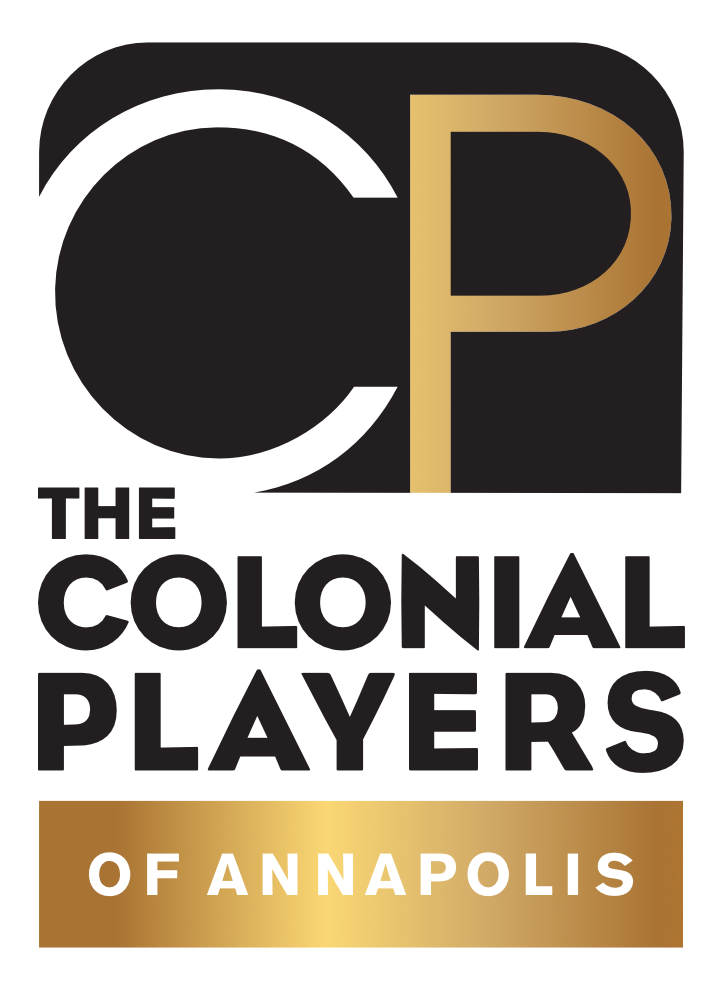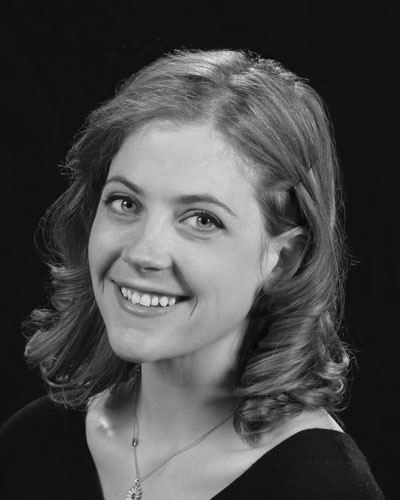
 "Acting is standing up naked and turning around very slowly"
"Acting is standing up naked and turning around very slowly"
~ Rosalind Russell
Interested in providing feedback on our monthly blog or suggestions for future topics? Send an email with your comments or ideas to This email address is being protected from spambots. You need JavaScript enabled to view it. for consideration!
Note: Opinions stated in this blog do not necessarily represent the opinions of The Colonial Players, Inc. Any similarities in the blog to any people, actors, or directors, living or dead, are not intended and are purely coincidental. No animals or producers were harmed in the writing of this blog.
THURSDAY, DECEMBER 17, 2015
Offbook: Happy Holidays!
By Sarah Wade
“Make them laugh, make them cry, and
hack to laughter. What do people go to the
theater for? An emotional exercise. I am a servant
of the people. I have never forgotten that.”
—Mary Pickford, silent film actress.
HAPPY HOLIDAYS, Y’ALL! WITH THIS FESTIVE SEASON ALREADY UPON US, IT’S hard to believe we’re three shows into the CP season. A fantastic season, I might add! As I write, we are approaching the last weekend of the run of Morning’s at Seven, and I’m sorry to see it go. It is absolutely delightful. I’m sure everyone realizes what a treat this cast is. 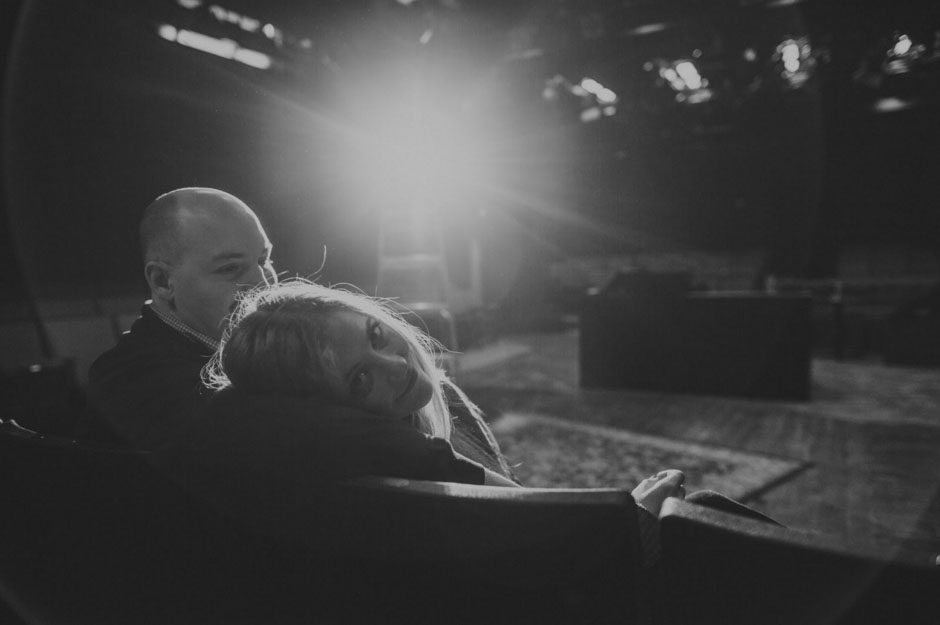 When I was growing up I especially admired these women—Carol Cohen, Lois Evans, Dianne Hood and Sharie Valerio—so to watch them onstage together is truly a gift.
When I was growing up I especially admired these women—Carol Cohen, Lois Evans, Dianne Hood and Sharie Valerio—so to watch them onstage together is truly a gift.
The show got me thinking about our history. I know a few members of that cast could tell some good stories about the earlier days of CP. I went through the show season history on the website and it’s incredible to see some of the shows we’ve done—shows that most of us probably weren’t around to see. Taming of the Shrew, Carousel, Twelfth Night, the list goes on.I don’t know how many of you ever sit back and think about Colonial Players, and how special it really is. We are on our 67th season. In a small city like Annapolis, that says something. For nearly 68 years, we have been creating art that the community has responded to. In 1949 a group of people got together, for the love of it, and I like to think that in the end, that is the spirit that we’re all still striving to embody.
It’s not like there haven’t been missteps. We’ve all stepped on each other’s toes now and then, figuratively and perhaps even literally, on stage. But we are family, all brought together by this magical little building and by our desire to create beautiful art.
Speaking of our building, I hope we all realize how fortunate we are to have the facilities that we do. For what began as a converted auto repair shop with coffee-can lights on stage, we certainly have come a long way, thanks to years of dedication. Did you know that when CP bought 108 East street, some members put up their own houses as collateral against the loan? That, my friends, is love. Love of the art, and of what they knew they were bringing to the community. Today, we have an extensive sound system and a lighting structure that some community theaters could only dream of. We might take for granted the fact that when you scan your key fob in, the lights come on, but we shouldn’t, because trust me, they didn’t always. Look how far we’ve come, and how far we can still go.
Our volunteers (and I say that because at the end of the day, and though sometimes it may not feel like it, it’s what we all are) are further proof that our founding members’ spirit lives on today. I see every day the lengths people go to to improve the theater and the experience that everyone has with it—from actors to behind-the-scenes volunteers and techies to our audiences. We redid the light grid to be more efficient, we got rid of that little step in A section, and lord knows I remember what the dressing rooms looked like 10 years ago. Why go to the effort? Because we wanted to make things better. Because this theater has proven to foster an environment that few places offer, and we owe it to ourselves and each other to take care of it and strive every day to enhance it even further.
Think of the memories that have been made here. The bonds that have been made. Life-long friendships, sometimes more. Heck, I met my future husband during A Christmas Carol (thanks Dad!), and I know I’m not the only one who has had a similar experience. Something happens here, a common ground is found. Lasting relationships take root. Next time you’re at Harry Browne’s after a show, take a look around the table. I’d bet that, if it weren’t for the theater, most of the people there wouldn’t have a reason to be in the same room together. But there we are. Drinking, laughing, going to each other’s homes, celebrating birthdays and weddings. How fortunate are we to be able to look around a room and know that the faces we look upon are our friends? What a rare and beautiful thing. My fiancé Eric told me once about how Shirley Panek and Jeff Mocho had him over for Christmas when he couldn’t go home to Wisconsin, and how Jean Berard invited him for Thanksgiving for the same reason. That meant so much to Eric, and he’ll likely never forget it. That’s simply wonderful, and we should celebrate the fact that we take care of our own in such a way.
I should probably wrap this up, as I’m starting to feel a little like Linus in A Charlie Brown Christmas. I wasn’t trying to get sappy and sentimental, but I think, especially this time of year, that the community we’ve built deserves to be recognized, and we should be heartened to think of all that we have and all we should be thankful for. I for one, am thankful that Tim hasn’t freaking fired me, considering how long this took to write. But seriously, I’m grateful that I have this opportunity, and I’m thankful that I have a place like Colonial Players to call home. As someone special to me once wrote, “from the oldest one among us, to the youngest of the lot, bless us all.”
TUESDAY, SEPTEMBER 22, 2015
Offbook: Watch on the Liar in Love Carol or,
Why Voluntelling is Wrong and the People Who Love Them
By Sarah Wade
I’m baaaaaack! You might wonder where the heck I’ve been, since I’ve been a pretty lousy blogger. I show up for one, and then disappear for a while. Maybe it’s because I’m not quite sure what I want to get at. Part of me wants to talk about what it feels like to feel in over your head and how frustrating it subsequently is to not feel competent at something. Another part wants to talk about theatre burn-out, where you’re almost so tired you (shudder) don’t enjoy it anymore. Then there’s a whole other part that wants to be positive and write about asking for help when you need it. So I’ve settled on a combination of all three. Let me be clear, I had the greatest time this season. I had the privilege of being in The Liar (#RubyGriffithWhatup), getting back into sound with Watch on the Rhine, and working with my dad, which was extra special, in Ernest in Love. And then….
Sigh.
Here’s the thing you guys. I’ve always wanted to costume. I thought it would be something I’d be good at—but I had a certain type of show in mind for my first crack at it. Something with a smallish cast, where I could take advantage of the costume closet and hopefully have few construction challenges. Not something where there had to be five of the exact same dress in different colors. I can’t sew. That’s a pretty significant handicap for a costume designer. So when Wes approached me during an after party and told me I would be costuming Why Torture is Wrong and the People Who Love Them, I told him “nuh-uh” and went back to my meatballs (the ones Shirley Panek makes. So good!). He said “Okay, great, I’ll add you to the list.” I would have objected more strenuously, but my mouth was full and Wes had run off—taking one of my meatballs with him.
Cut to a month or two later. I’m at a Torture rehearsal at the annex, holding up a sweater, and director Kris Kauff is giving me a look that quite clearly says, “Meh.” I smile and turn back for the costume closet, resolved to hide under the 1776 rack until the closing night party. I felt pretty lost, and pretty hopeless. I didn’t think I was ever going to find something that felt right. I didn’t feel as though I was getting these characters. I also had to reconcile the few visions I did have with certain staging challenges, which wasn’t going well for me. I wasn’t feeling confident, and I definitely wasn’t feeling artistic. After the high I felt during Ernest, this felt pretty low. I was also exhausted, coming off of four shows in a row (A Christmas Carol, The Liar (#winners), Watch on the Rhine, Ernest in Love) and this would be my fifth. I wanted to hide someplace where Wes would never find me and never wrangle me into anything ever again.
Luckily—though part of me was too proud to admit I was in over my head—I had the good sense to ask for help. It would be plain silly, after all, to just sit and flounder when I had great experience, talent and resources at my fingertips. Thank goodness for Beth Terranova, Kaelynn Miller, and Jean Berard. I don’t even want to know what would have happened if they hadn’t been so helpful and so patient with me. Jean made all of her own dresses. You read that right: she made her own dresses. I don’t know how she did this while also managing to be fantastic as Luella, but she did, and I am forever indebted to her. Beth, who knows her way around the costume closet better than anyone, had such a better idea than I did about what we had and where to find it. I couldn’t have done it without her. She also taught me how to take out seams, while Kaelynn taught me the art of sewing buttons, and also gave me wonderful ideas for patterns. Truly, I’d have been sunk without these three ladies.
There were times I seriously wanted to quit, to cut my losses and resolve to never do this again. But I stuck it out. The next time I do it—and I hope there is a next time—I’ll feel better prepared, and hopefully happier with my efforts.
So, dear readers, what is the take-away from all this? Don’t shy away from challenges? Don’t be afraid to ask for help? That might be too simplistic. I’m going with this: Don’t let pride stop you from doing good work. It doesn’t mean you’re any less of a designer or an actor. If you’re struggling, you’re struggling. It happens. And sometimes, another pair of hands or eyes can make all the difference. Or a single word, something you hadn’t thought of at first, can spark your own fire. If I had assumed the entire burden of the costumes, if I hadn’t asked for help, it would have been ugly. Literally ugly. I’m so glad I had someone there to step in and say, ‘Hey, this might not look right under the light,” or “Hmm, that might not work for this gag.” Actors, how many times have you wrestled with the delivery of a particular line? Then the director offers a simple but supremely sensible bit of advice and—poof!—it clicks! Does that mean you are less of an actor? Hell no! We’ve all been there. And if you say you haven’t, then, well . . . liar, liar, pants on fire.
This brings us to the end of my second post. I promise it won’t take another three months for the next one. In the meantime, Eric and I are going to the beach with Wes and Kaelynn (#byeFelicia), and then I’ll turning my life over to the sound design of Side Man—diving head first into the world of jazz. Maybe I’ll learn something...
~Sarah
Webmaster's Note: Wes only voluntells people with whom he loves to work... ;-)
SUNDAY, MAY 10, 2015
Offbook: A Ghost Light In-The-Round
By Wes Bedsworth
Operations Director
Hello OffBook readers! Fear not, Sarah will return next month. We're giving her one more month off since she's currently performing in Ernest in Love (come see it! it's adorable!) as Cecily... and possibly also because I felt guilty for strong-arming her into being our costume designer for the June production of Why Torture Is Wrong, and the People Who Love Them. She'll survive to blog another day, though. I wanted to take the opportunity in the blog to highlight one of the newer "features" in our building, which also brings in a bit of theater tradition: the Ghost Light. I apologize in advance, as I know I get a little technical at the end, but I know there are at least a few other nerds like me who will appreciate it! Here goes...
Many, if not most theaters have a tradition which involves leaving a dim light on in their performance space when it is vacant. This light is known by a few different names, Equity Light and Equity Lamp among them. However, a quick Google search or conversation with your favorite thespian (when they're not trying to lure you to their next show) would imply that this light is best known as the "Ghost Light." 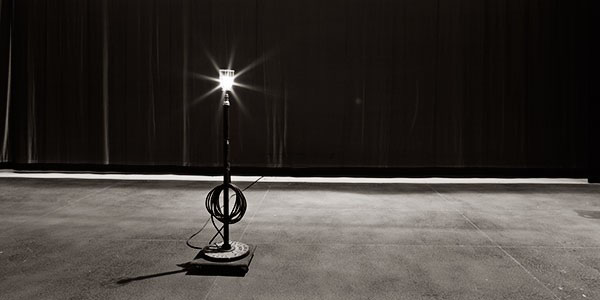 From what we can tell, the origin of the Ghost Light is hazy, at best, but most descriptions seem to take a similar form: a single exposed light in the form of gas, incandescent, CFL, or now even LED, housed in a small cage atop a moveable pedestal. The pedestal is generally placed somewhere near center stage, although this may vary by venue.
From what we can tell, the origin of the Ghost Light is hazy, at best, but most descriptions seem to take a similar form: a single exposed light in the form of gas, incandescent, CFL, or now even LED, housed in a small cage atop a moveable pedestal. The pedestal is generally placed somewhere near center stage, although this may vary by venue.
One particular explanation for the Ghost Light dates back to the 1800s when theatres were lit using gas-burning instruments before the electric lamp became widespread. Theaters had their own coal gas generators feeding a distribution system inside the venue that led to and controlled each lighting instrument. The Ghost Light was said to have been used to leave a flame going when all the lights were extinguished. This continuous flame supposedly prevented dangerous pressure from building in the gas lines, lowering the risk of a devastating explosion when the theatre was dark.
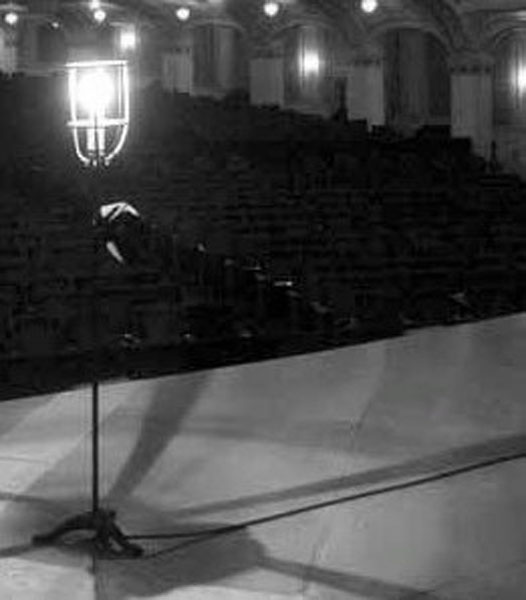 ...and what would something like a Ghost Light be if there weren't also some theatrical lore and superstition tied to it as well? It is believed by many that every theatre is haunted by at least one spirit, and that the Ghost Light is an essential component in keeping happy those spirits of thespians past. The light is said to allow them to perform on stage when the building is unoccupied without the dangers of "running into" the scenery (although one must wonder how a spirit would run into something when they are usually able to float through walls!). The Ghost Light also keeps evil spirits at bay, so the stories go, such that they do not interfere with ongoing productions. Phantom of the Opera, anyone? Beyond superstitions involving ghosts, there are also superstitions about a "dark" theatre. When a theatre is "dark", no production is currently running. It is believed by some that the Ghost Light ensures that a theatre is never truly "dark," thereby avoiding any associated bad luck.
...and what would something like a Ghost Light be if there weren't also some theatrical lore and superstition tied to it as well? It is believed by many that every theatre is haunted by at least one spirit, and that the Ghost Light is an essential component in keeping happy those spirits of thespians past. The light is said to allow them to perform on stage when the building is unoccupied without the dangers of "running into" the scenery (although one must wonder how a spirit would run into something when they are usually able to float through walls!). The Ghost Light also keeps evil spirits at bay, so the stories go, such that they do not interfere with ongoing productions. Phantom of the Opera, anyone? Beyond superstitions involving ghosts, there are also superstitions about a "dark" theatre. When a theatre is "dark", no production is currently running. It is believed by some that the Ghost Light ensures that a theatre is never truly "dark," thereby avoiding any associated bad luck.
Of course, regardless of whether it was part of the original driver behind the first Ghost Light, the practical explanation is that the light provides a level of safety for the living actors and staff who may find themselves in the building after hours. In a completely dark venue, it can be very easy for someone to trip over or walk into scenery, set pieces, or other obstacles; in a proscenium venue, there's an added danger of falling off of the stage into the orchestra pit. Having even the dim light of a Ghost Light enables one to see enough to avoid most dangers.
Enter Colonial Players theatre-in-the-round. In our unique space, taking a tumble off of the stage would require significant skill given that the stage is at the same level as the audience and we're lacking the orchestra pit found in many other venues. We do, however, have a few of our own concerns that are worthy of some kind of safety light, in addition to any fun superstitions we may want to attach to it.
If you've ever been in our performance space at night, or even during the day, and have had the lights turned off on you, you are already aware of how disoriented you can become. While we do have prominent EXIT signs posted at the two doors to the space, until your eyes adjust to the darkness, these really don't provide much help. After a minute or so, the EXIT signs cast enough dim light that you can almost make out the E1 and E3 exit ramps to get out of the space and try to find a light switch.
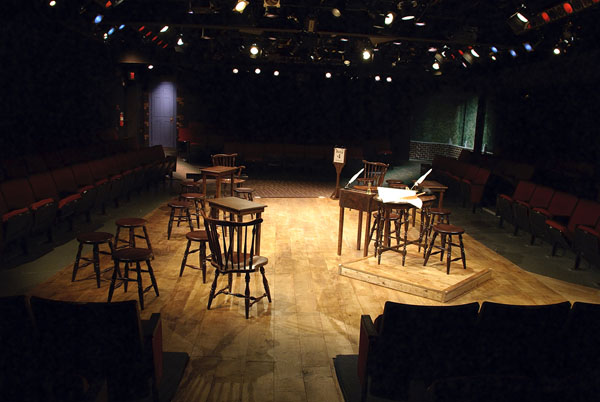 Stumbling around in the dark in our theater (or any!) is a risky proposition because of how often our sets, platforms, and alleys change to meet the demands of each particular production. Depending on the show, we have had anything from a couple small chairs on the stage (Hauptman) to a raised platform with a desk and chair, 18 stools, 3 Windsor chairs, a few tables, and a faux wall (1776), to a full house worth of furniture and very breakable props (Watch on the Rhine). One might also stumble upon (or over) a grand piano and other set pieces in E4 (In the Next Room), raised platforms dividing C Alley in half (Bat Boy), a complete waterfall system in C Alley (Wonder of the World), or even a drinking well in E2 (Cinderella Waltz) completely blocking the exit ramp. During construction weeks, things are even more chaotic because beyond all of the set pieces, there are tools, ladders, lighting instruments, tables, boxes, and various other items for one to trip over, run into, and/or impale oneself upon. And don't forget the techs and designers sleeping on the floor, trying to catch an hour or two of sleep between Dry Tech and Cue-to-Cue!
Stumbling around in the dark in our theater (or any!) is a risky proposition because of how often our sets, platforms, and alleys change to meet the demands of each particular production. Depending on the show, we have had anything from a couple small chairs on the stage (Hauptman) to a raised platform with a desk and chair, 18 stools, 3 Windsor chairs, a few tables, and a faux wall (1776), to a full house worth of furniture and very breakable props (Watch on the Rhine). One might also stumble upon (or over) a grand piano and other set pieces in E4 (In the Next Room), raised platforms dividing C Alley in half (Bat Boy), a complete waterfall system in C Alley (Wonder of the World), or even a drinking well in E2 (Cinderella Waltz) completely blocking the exit ramp. During construction weeks, things are even more chaotic because beyond all of the set pieces, there are tools, ladders, lighting instruments, tables, boxes, and various other items for one to trip over, run into, and/or impale oneself upon. And don't forget the techs and designers sleeping on the floor, trying to catch an hour or two of sleep between Dry Tech and Cue-to-Cue!
The obvious answer to make our performance space a little bit safer with the lights out was to find a way to implement a night light or sorts. What fun would that be if we didn't name it our very own Ghost Light in the process, though? The proposition was somewhat challenging given that we have so many different people coming and going every day that would need training on remembering to turn on and set out a Ghost Light. It doesn't do much good to have Ghost Light if it's not consistently turned on! How do we handle such a thing to make it easy and consistent, and so that we're not creating one more thing people have to remember to do when they leave? The answer: hang a Ghost Light from above so it doesn't have to be "set out," and then find a way to make it automatic so no one has to even think about it.
As background for those who aren't familiar, almost all of the general lighting in our building has been automated over the past few years, which means it can be centrally controlled by our building automation system. This system has made possible a number of helpful simplifications to our operation:
- Pre-programmed lighting scenes in the lobby which are activated by the "doorbell" buttons near the bar, making it simple for all ushers to quickly learn to control the lobby lighting. Previously, ushers had to manage 16 individual switches in four different locations to adjust front-of-house lighting; now it's just one button.
- Pre-programmed lighting "scenes" backstage activated by a set of backlit scene control buttons, allowing the Stage Manager one-button control of 20 individual switches backstage, plus two lobby lighting presets.
- Pre-programmed lighting scenes in the Theater activated by a set of backlit scene control buttons in the Booth, allowing the Show Technician one-button control of 8 switches for setting lights for pre-show setup, performance, and post-show cleanup, plus two lobby lighting presets.
- Automated lobby night lights, exterior lights, flagpole lighting, and marquee lighting that adjusts for Daylight Savings Time as well as sunrise/sunset without any intervention.
- Automatic shut off on all interior lights at certain hours of the night to prevent lights from being left on overnight by accident.
Given the flexibility of what lighting automation can achieve and has already achieved for us, we took a look at how this existing system might allow for a Ghost Light that our volunteers didn't have to worry about.
 The line of automated switches we've deployed includes the option for a product called a Fixture Relay Module (FMR), which is essentially a remotely controllable component that can turn any connected device on or off. This is the product we picked for controlling our Ghost Light.
The line of automated switches we've deployed includes the option for a product called a Fixture Relay Module (FMR), which is essentially a remotely controllable component that can turn any connected device on or off. This is the product we picked for controlling our Ghost Light.
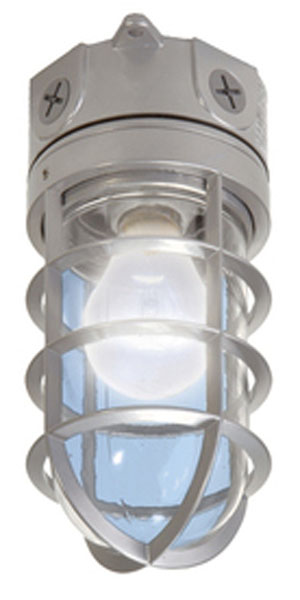 Next we needed an actual Ghost Light fixture to control. Given that it would be somewhat of a hassle for people to have to set out a traditional pedestal Ghost Light every time they leave, and it could be knocked over, and it would have to be stored somewhere in a building already tight on space, a ceiling-mount fixture like the one described earlier was the ideal choice for us. Looking at the available options at Home Depot and Maurice Electrical, the ceiling mount Vapor Light seemed like the best choice because it included a cage around the bulb which would protect it from being accidentally broken during a light hang event (plus it meets the "caged bulb" requirement of a traditional Ghost Light!). The Vapor Light is so named because it is suitable for wet environments, but that feature is irrelevant to our application... although if the roof leaks again...
Next we needed an actual Ghost Light fixture to control. Given that it would be somewhat of a hassle for people to have to set out a traditional pedestal Ghost Light every time they leave, and it could be knocked over, and it would have to be stored somewhere in a building already tight on space, a ceiling-mount fixture like the one described earlier was the ideal choice for us. Looking at the available options at Home Depot and Maurice Electrical, the ceiling mount Vapor Light seemed like the best choice because it included a cage around the bulb which would protect it from being accidentally broken during a light hang event (plus it meets the "caged bulb" requirement of a traditional Ghost Light!). The Vapor Light is so named because it is suitable for wet environments, but that feature is irrelevant to our application... although if the roof leaks again...
 The recent popularity and price decline of consumer LED bulbs made these an obvious choice for illuminating our Ghost Light fixture. We needed something that would provide enough light to allow someone to see in the unlit space, while not wasting a lot of energy in the process. Cree offers a 6 Watt warm white LED bulb that is a 25 Watt equivalent. This was the perfect product for our project!
The recent popularity and price decline of consumer LED bulbs made these an obvious choice for illuminating our Ghost Light fixture. We needed something that would provide enough light to allow someone to see in the unlit space, while not wasting a lot of energy in the process. Cree offers a 6 Watt warm white LED bulb that is a 25 Watt equivalent. This was the perfect product for our project!
Installing the Ghost Light system was relatively straight forward. It was simply a matter of attaching the Vapor Light fixtures to the ceiling above the new light grid so that they were out of the way and unobtrusive, connecting them with Electrical Metallic Tubing (EMT conduit), and attaching the FMR controller mentioned earlier. We installed a total of four fixtures, one over each half of the stage, and one each in A and C Alleys. Power was already available in the ceiling by way of the existing Work Light circuit, so no new circuit had to be run from the Tech Booth.
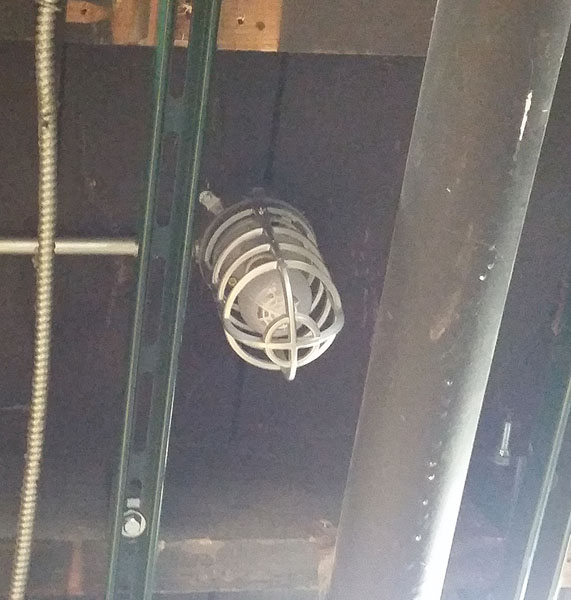 Now for the fun part: making it turn on and off automatically. At first glance, this seems straightforward. Anytime the Work Lights are off, the Ghost Light should be on, right? Yes, except when we have a performance. All of the lights need to be out in that case unless we want the Ghost Light to be a permanent part of the lighting designs. As part of the summer light grid and House Light renovation, we installed a lighting scene controller in the Tech Booth (mentioned earlier) that allows the Tech to quickly switch lighting scenes in the performance space. This controller allowed us to easily modify the lighting scenes to include the Ghost Light where appropriate (ON when all lights off, OFF during performance mode, and OFF when Work Lights are on).
Now for the fun part: making it turn on and off automatically. At first glance, this seems straightforward. Anytime the Work Lights are off, the Ghost Light should be on, right? Yes, except when we have a performance. All of the lights need to be out in that case unless we want the Ghost Light to be a permanent part of the lighting designs. As part of the summer light grid and House Light renovation, we installed a lighting scene controller in the Tech Booth (mentioned earlier) that allows the Tech to quickly switch lighting scenes in the performance space. This controller allowed us to easily modify the lighting scenes to include the Ghost Light where appropriate (ON when all lights off, OFF during performance mode, and OFF when Work Lights are on). 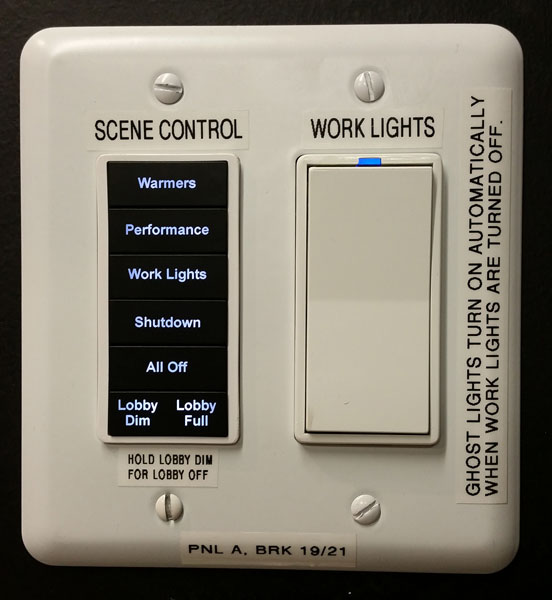 Beyond the lighting scene controller programming, we were able to program the dedicated Work Light switches to transmit ON/OFF commands to the Ghost Light when used (ON when Work Lights turned off, OFF when Work Lights turned on).
Beyond the lighting scene controller programming, we were able to program the dedicated Work Light switches to transmit ON/OFF commands to the Ghost Light when used (ON when Work Lights turned off, OFF when Work Lights turned on).
With a little bit of creativity, some simple conduit work, and some quick automation programming, we now have our very own Ghost Light that takes care of itself! Now when you come in the theater when it is unoccupied, a dim light will keep you from tripping over any surprise set pieces or other objects, and will help you find one of the light switches to turn on the Work Lights if you get stuck in the dark. Thanks to LED bulbs totaling 24W (6W x 4 bulbs), it costs us less than a nickel per day to run, too!
Now the question is: with the Ghost Lights in place, sufficiently lighting the stage, will spirits of actors past take it as an invitation to tread the boards at night when no one is around? Let us know if you're interested in spending the night on the stage to find out... I'm not! Either way, though, if you ever have the opportunity, check out the Ghost Light and let us know what you think!
For The Love Of It,
~Wes
References:
- http://en.wikipedia.org/wiki/Ghost_light_%28theatre%29
- http://dictionary.tdf.org/ghost-light-fina/
- http://seeksghosts.blogspot.com/2013/03/theatre-ghost-light-superstitions.html
- http://listverse.com/2010/08/20/top-10-theater-superstitions/
- http://www.broadwayspotted.com/ever-wondered-why/
- http://www.playbill.com/features/article/ask-playbill.com-the-ghost-light-153440
- http://en.wikipedia.org/wiki/Gas_lighting
- http://www.theatrecrafts.com/page.php?id=610
SATURDAY, APRIL 18, 2015
Offbook: The Archives Project
By Hannah Sturm
Hello CP! This week I (Hannah Sturm, Deputy Operations Director and guest blogger) will be taking you on a journey to the past! However, it will not include any time travel machines or magic, flashing lights, or extraterrestrial sounds. Just some old pieces of paper in a bunch of cardboard boxes - some very exciting old pieces of paper.
That CP has a collection of records at the Maryland State Archives was unknown to me until I worked at MSA last year. For my first real life job post-graduation, I interned in MSA’s Special Collections department. Some glamorous highlights were rehousing original printings of the Maryland Gazette from July of 1776 (!) and helping to catalog objects in Governor O’Malley’s office near the end of his term (!). These were wonderful once in a lifetime opportunities, and don’t get me wrong - I enjoyed them and learned a lot. But, I was a theater major in college. I get my kicks from doing things like hanging lights, making three headed alien costumes, and helping Wes keep the Operations Team organized.
After getting permission from my supervisors, I spent some time tucked away in MSA’s stacks rooting through CP’s twenty six boxes to verify and update their catalog records. It was really fun for me to see pictures from past productions, telegrams sent backstage, and tickets from CP’s first production, “The Male Animal.” We are very, very lucky that so much was safely packed away and sent to the climate controlled rooms at MSA by CP volunteers, and everyone who contributed deserves a massive thank you.
Seeing all of these things made me happy and excited (who needs to handle Civil War era flags when you can look at a stack of 80’s headshots?) but at the same time a little sad. These wonderful objects are not very accessible as-is. Currently, you need to be one of a handful of people on a list to be able to have the records pulled at MSA, and then you need to have the time to root through them to find what you want.
Enter CP’s Archive Team. Since October, myself, Wes Bedsworth, Chris Haley, Scott Nichols, Theresa Riffle, and Charlotte Robinson have been working on the painstaking process of identifying, re-filing, and cataloging all of these documents in a fancy spreadsheet. While the main motivating factor is making all of these documents accessible to all of you, some things need to come first: basic organization, recording what we have, and making sure that everything is stored safely (taking off rusty paper clips and dried rubber bands, unfolding paper before it gets too brittle to unfold without breaking, etc).
With a good amount of hand-holding from MSA’s Special Collections department, the Archive Team feels capable of taking on this huge and sensitive task. We have already cataloged several boxes of materials and are working on fleshing out a mission statement and long-term plan.
And before anyone asks about digitization - the answer is yes! But just not yet and not everything. Twenty some filled boxes are a lot of documents and the long term safety of everything has to come first, especially when a lot of our documents are photographs and newsprint. When everything is organized and we have a complete idea of what we have - then we will work on deciding what needs to be digitized and how to go about doing it the right way.
In the meantime, here are some teasers from the boxes the Archive Team is working through right now. Do you recognize any faces?
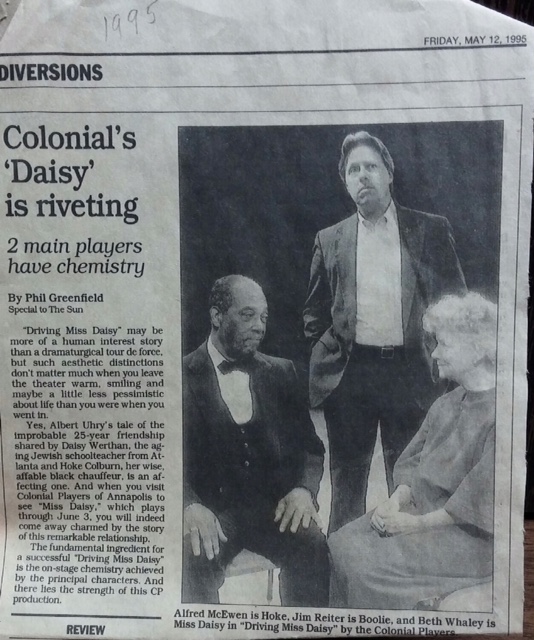
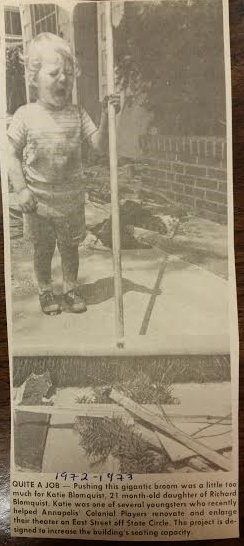
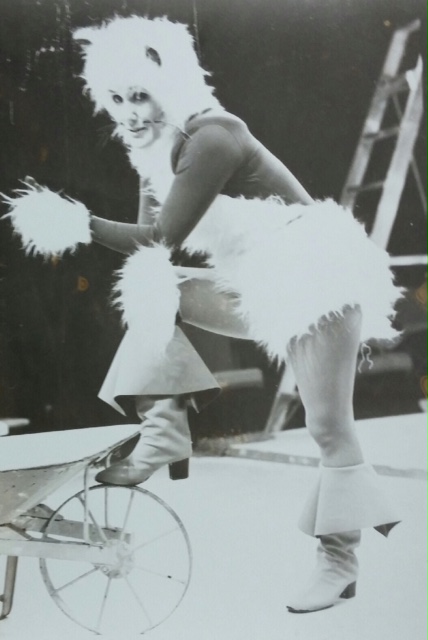
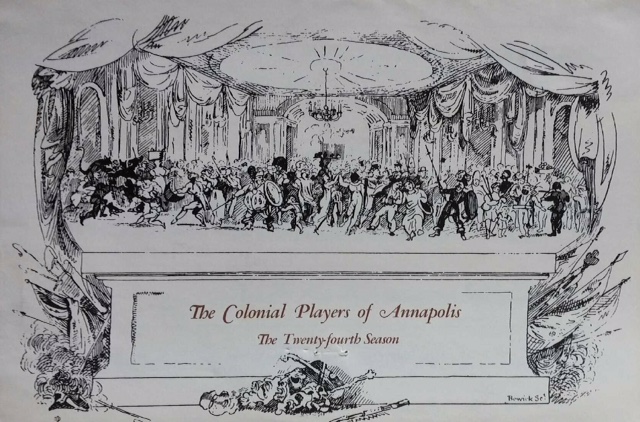
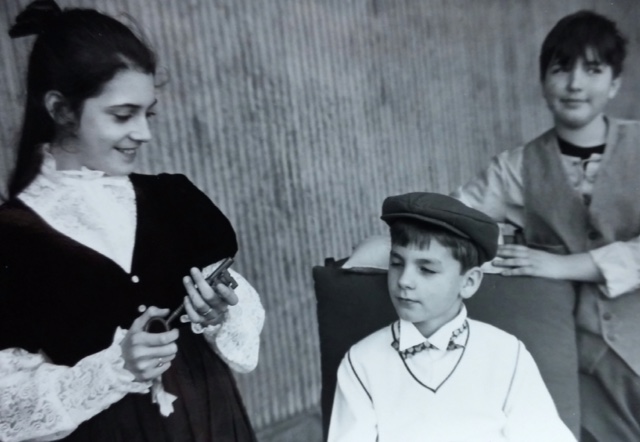
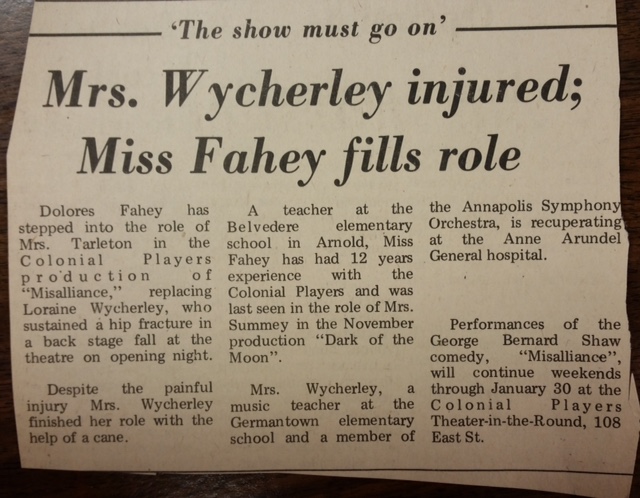
Don't miss out! Sign up for our email list by clicking here!
To contact The Colonial Players, please refer to the email directory on our Contact Us page or email This email address is being protected from spambots. You need JavaScript enabled to view it..
For questions about tickets and subscriptions, email This email address is being protected from spambots. You need JavaScript enabled to view it..
For website comments, questions, suggestions, as well as copyright and usage information, please contact This email address is being protected from spambots. You need JavaScript enabled to view it..
Copyright 2025 • The Colonial Players, Inc. • 108 East Street • Annapolis, MD 21401 • Phone: 410-268-7373
